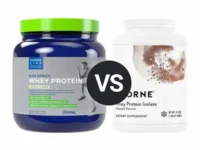Knowledge BaseYou're Questions Answered
BACK
Should I use a protein powder with digestive enzymes?
Using protein powder with digestive enzymes can be beneficial, especially if you experience digestive discomfort such as bloating or gas after consuming protein supplements. Digestive enzymes, such as protease, lactase, and amylase, can help break down proteins, lactose, and starches, making it easier for your body to absorb these nutrients and minimize digestive issues.
Benefits of Protein Powders with Digestive Enzymes:
- Improved Digestion: Enzymes like protease help break down protein into smaller peptides and amino acids, which can be easier for the body to absorb. This can be particularly helpful for individuals with digestive conditions that impair protein digestion1.
- Reduced Bloating and Gas: Proteins, especially from sources like whey or casein, can cause bloating and gas in some people. Digestive enzymes can help reduce these symptoms by facilitating more complete digestion of the protein2.
- Enhanced Nutrient Absorption: Efficient breakdown of proteins and other components in the digestive tract can lead to better nutrient absorption, maximizing the benefits of the protein powder3.
- Versatility for Lactose Intolerance: If the protein powder is based on dairy (like whey or casein) and includes lactase, it can be more suitable for individuals with lactose intolerance, as lactase helps digest lactose found in milk products4.
Considerations:
- Personal Needs: If you do not typically experience digestive issues with protein powders, you might not need a product with added enzymes. These products can sometimes be more expensive, so it may not be worth the additional cost if you are not experiencing digestive discomfort5.
- Quality and Effectiveness: Not all enzyme supplements are created equal. The effectiveness of digestive enzymes can vary based on the types and amounts of enzymes included in the formula. It’s important to choose a reputable brand that provides detailed information about the enzyme activity levels6.
- Dietary Preferences: Some protein powders with digestive enzymes may contain additional ingredients or additives. Always check the label to ensure that the product aligns with your dietary restrictions or preferences7.
Was this answer helpful? Let us know!
Like
References:
- Roxas, M. (2008). The role of enzyme supplementation in digestive disorders. Alternative Medicine Review, 13(4), 307-314.
- Ianiro, G., Pecere, S., Giorgio, V., Gasbarrini, A., & Cammarota, G. (2016). Digestive enzyme supplementation in gastrointestinal diseases. Current Drug Metabolism, 17(2), 187-193.
- Smith, J. P., Daifas, D. P., El-Khoury, W., Koukoutsis, J., & El-Khoury, A. (2004). Role of protein in sports nutrition. Nutrition Research Reviews, 17(2), 233-244.
- Suarez, F. L., Savaiano, D., & Levitt, M. D. (1995). A comparison of symptoms after the consumption of milk or lactose-hydrolyzed milk by people with self-reported severe lactose intolerance. New England Journal of Medicine, 333(1), 1-4.
- US National Library of Medicine. (2021). Protein in diet. MedlinePlus.
- Consumer Reports. (2010). Supplements: Who needs them? A Consumer Reports investigation.
Add to this Answer

Disclosure
Your Answer
Do you have a suggestion to improve the answer? Please detail your suggestions and provide any references to information that may support your answer if available.
The content on this site has not been written, reviewed or endorsed by a medical professional. We assume no liability for the misuse of supplements and recommend you review the label of any product, as well as consulting with your health care professional.
We are a participant in the Amazon Services LLC Associates Program, an affiliate advertising program designed to provide a means for us to earn fees by linking to Amazon.com and affiliated sites.
We are a participant in the Amazon Services LLC Associates Program, an affiliate advertising program designed to provide a means for us to earn fees by linking to Amazon.com and affiliated sites.
© 2026 ProteinPowder.com



